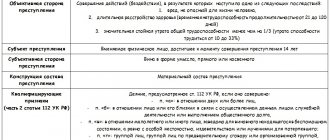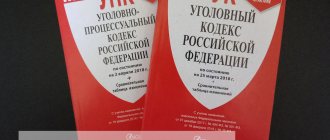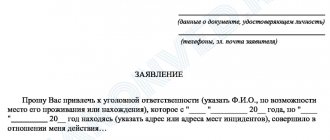Criminal Code of the Russian Federation in the latest edition:
Article 115 of the Criminal Code of the Russian Federation. Intentional infliction of minor bodily harm
1. Intentional infliction of slight harm to health, causing short-term health disorder or minor permanent loss of general ability to work, -
shall be punishable by a fine in the amount of up to forty thousand rubles, or in the amount of the wages or other income of the convicted person for a period of up to three months, or by compulsory labor for a term of up to four hundred eighty hours, or by corrective labor for a term of up to one year, or by arrest for a term of up to four months.
2. The same act committed:
a) for hooligan reasons;
b) for reasons of political, ideological, racial, national or religious hatred or enmity, or for reasons of hatred or enmity towards any social group;
c) using weapons or objects used as weapons;
d) in relation to a person or his relatives in connection with the performance of official activities by this person or the performance of public duty, -
shall be punishable by compulsory labor for a term of up to three hundred sixty hours, or correctional labor for a term of up to one year, or restriction of liberty for a term of up to two years, or forced labor for a term of up to two years, or arrest for a term of up to six months, or imprisonment for a term of up to two years.
Return to the table of contents of the document: Criminal Code of the Russian Federation in the latest edition
Statistics data
According to the statistics of the Armed Forces:
- In 2021, in cases of private prosecution, Part 1 of Art. 115 and part 1 of Art. 116 of the Criminal Code of the Russian Federation, 7671 cases were considered in the courts, of which 2863 resulted in a verdict and in 4748 cases the cases were dismissed.
- Over the 6 months of 2021, the courts initiated and considered cases based on statements from victims in the amount of 3,888 cases, of which 1,348 were sentenced and 2,103 cases were dismissed.
Unfortunately, the consideration of cases of this category in magistrates' courts is growing every year and in most cases ends in the courts with reconciliation of the parties.
Group attack on police officers
If a police officer (or a representative of the authorities) was at work at the time of the commission of the crime, that is, while performing the duties provided for by his position, another part of the Criminal Code is applied. In 318 art. liability is provided for causing any harm to a police officer through the use of violence or only the threat of its use. In this case, two parts are provided - for acts dangerous to life and health and for non-dangerous ones.
Guilt accrues in accordance with the law also if the crime was committed as revenge for any action committed by a police officer or a representative of an authority in the performance of his work duties.
If an encroachment on the life of a policeman is established, then an even stricter Art. 317. Under it, the accused can receive life imprisonment.
Maximum liability in this case is imprisonment for up to 10 years.
What punishment awaits under Art. 115 of the Criminal Code of the Russian Federation
So Art. 115 of the Criminal Code of the Russian Federation provides for criminal liability for intentional infliction of minor harm to health and consists of 2 parts.
Part 1 – Intentional infliction of minor harm to health, causing short-term health disorder or minor permanent loss of general ability to work.
Punishable by a fine in the amount of up to 40,000 rubles or in the amount of the wages or other income of the convicted person for a period of up to 3 months, or by compulsory labor for a period of up to 480 hours, or by corrective labor for a term of up to one year, or by arrest for a term of up to 4 months.
Part 2 – The same act committed: a) from hooligan motives; b) for reasons of political, ideological, racial, national or religious hatred or enmity, or for reasons of hatred or enmity towards any social group; c) using weapons or objects used as weapons.
Punishable by compulsory labor for a term of up to 360 hours, or correctional labor for a term of up to one year, or restriction of freedom for a term of up to 2 years, or forced labor for a term of up to 2 years, or arrest for a term of up to 6 months, or imprisonment for a term of up to 2 years.
Factors influencing the qualification of an incident
When deciding under which article the attackers will be charged, law enforcement agencies rely on the following conditions:
- the severity of the harm caused to the victim’s health;
- how many attackers there were; how many were attacked - if there were several, this usually aggravates the guilt;
- what goals they pursued;
- whether the victim is a minor - this increases the severity of the punishment that may follow;
- whether there was a conspiracy before committing a group crime (beating).
For a conviction under any of the articles relating to battery, the main parameter for classification is the first point. Depending on how seriously the victim suffered, for a group crime, Articles 111, 112, 117 may be applied. Criminal Code of the Russian Federation. Causing harm that can be considered minor is also covered in Art. 115, but it does not provide for a separate punishment for a group assault with beating. The situation is similar with Art. 116, which provides for liability for beatings that did not entail significant consequences, but were accompanied by pain. It also does not have a separate clause for group action.
What is “minor harm to health”
When analyzing the concept of “minor harm to health”, which is mentioned in the article, one cannot do without Order of the Ministry of Health of Russia No. 194 “On approval of Medical criteria for determining the severity of harm caused to human health” and Decree of the Government of the Russian Federation No. 522 “On approval of the Rules for determining the severity of harm caused to human health” because these documents reflect the following signs of minor harm to health:
- the amount of disability should not exceed 10% of the total;
- the duration of the disorder of the affected person should not exceed 21 days; damage in the form of hematomas, bruises, abrasions and bruises must be confirmed in the form of medical certificates and reports.
Thus, immediately after receiving a beating, the victim must contact a medical institution and obtain a certificate of health and harm, or undergo an examination in a specialized institution and obtain an expert opinion.
Briefly about 115-FZ
115-FZ “On combating the legalization (laundering) of proceeds from crime and/or the financing of terrorism” is aimed at tracking financial transactions through which a business hides the illegal source of funds.
The bank follows this law to find out how the business received the money and whether the capital is being used for criminal purposes. If in doubt, the bank turns to entrepreneurs for explanations and supporting documents. These are called “compliance requests” - the bank client is obliged to respond to them. If they are ignored, the bank may refuse to carry out subsequent transactions and terminate the contract.
What punishment awaits under Art. 116 of the Criminal Code of the Russian Federation
Similar to Art. 115 of the Criminal Code of the Russian Federation is Art. 116 of the Criminal Code of the Russian Federation, which is called “Beatings”.
The article states that beatings or other violent actions that caused physical pain, but did not entail the consequences specified in Article 115 of the Criminal Code, committed from hooligan motives, as well as based on political, ideological, racial, national or religious hatred or enmity, or based on hatred or hostility towards any social group, is punishable by compulsory labor for a term of up to 360 hours, or correctional labor for a term of up to one year, or restriction of freedom for a term of up to 2 years, or forced labor for a term of up to 2 years, or arrest for a term of up to 6 months, or imprisonment for up to 2 years.
This category of cases is called private prosecution cases. In order to bring the perpetrator to criminal liability under Part 1 of Art. 115 of the Criminal Code of the Russian Federation and Art. 116.1 of the Criminal Code of the Russian Federation (battery by a person subject to administrative punishment), the victim must himself contact the magistrate at the place where the crime was committed with a statement to bring the perpetrator to criminal liability, and provide similar evidence.
I would like to draw attention to the fact that it is the person who went to court who is obliged to prove that the accused inflicted the beatings, foreseeing in advance what consequences they would lead to.
Those. It is the desire of the accused to inflict beatings that must be established. If your health has deteriorated as a result of negligence, even in a fit of anger, an accidental collision of heads, etc. criminal prosecution is impossible.
Judicial practice under Article 115 of the Criminal Code of the Russian Federation
Ruling of the Supreme Court of the Russian Federation dated February 21, 2017 N 5-UD17-9
By the verdict of the Tushinsky District Court of Moscow dated May 12, 2009, I. (previously convicted) was convicted: under Part 1 of Art. 115 of the Criminal Code of the Russian Federation - to six months of correctional labor with the withholding of 10% of wages to the state; according to paragraphs “b”, “c”, part 2 of Art. 131 of the Criminal Code of the Russian Federation - to five years in prison; according to paragraphs “b”, “c”, part 2 of Art. 132 of the Criminal Code of the Russian Federation - to five years in prison. Based on Part 3 of Art. and clause “c” of Part 1 of Art. According to the Criminal Code of the Russian Federation, for the totality of crimes, by partial addition of punishments, I. was finally sentenced to seven years in prison.
Resolution of the Presidium of the Supreme Court of the Russian Federation dated March 14, 2018 N 306P17
Abdurakhmonov Saidmurod Bekovich, ... convicted on January 20, 2010 under clause “d”, part 2 of art. 161, part 1 art. 161, part 1 art. 115 of the Criminal Code of the Russian Federation to 2 years 6 months in prison, released on July 18, 2011 after serving his sentence, was detained on August 16, 2012 in accordance with Art. Art. 91, 92 of the Code of Criminal Procedure of the Russian Federation on suspicion of committing a crime under paragraph “b” of Part 4 of Art. 132 of the Criminal Code of the Russian Federation.
Resolution of the Presidium of the Supreme Court of the Russian Federation dated 06.06.2018 N 60P18
Ionov was acquitted: under Part 1 of Art. 210, according to Part 2 of Art. 213, paragraphs “g”, “e”, part 2 of Art. 112 of the Criminal Code of the Russian Federation (on charges of committing crimes against the victims of G.V.T.K. under “a” part 3 of Article 163 of the Criminal Code of the Russian Federation (on charges of committing a crime against M.) under paragraph “a” part 2 of Article 115 of the Criminal Code of the Russian Federation (on charges of committing a crime against N.) under paragraph “a” of Part 2 of Article 116 of the Criminal Code of the Russian Federation (on charges of committing a crime against Ya. on October 29, 2013), on clause "a" part 3 of article 111 of the Criminal Code of the Russian Federation (on charges of committing a crime against K.) under part 2 of article 213, clause "a" part 2 of article 115 of the Criminal Code of the Russian Federation (on charges of committing crimes against T.) on the basis of clause 2, part 1, article 24 of the Code of Criminal Procedure of the Russian Federation, clause 3, part 2, article 302 of the Code of Criminal Procedure of the Russian Federation due to the lack of corpus delicti, he is recognized as having the right to rehabilitation (with the exception of acquittal under Part 1 Article 210 of the Criminal Code of the Russian Federation).
Appeal ruling of the Judicial Collegium for Criminal Cases of the Supreme Court of the Russian Federation dated 06.06.2018 N 44-APU18-8sp
Convict Apet asks to reclassify her actions to clause “c” of Part 2 of Art. 115 of the Criminal Code of the Russian Federation or reduce the punishment to the minimum under the sanction of Part 2 of Art. 105 of the Criminal Code of the Russian Federation; notes that she caused a wound to the victim, which qualifies as minor harm to health, and was not involved in causing other bodily injuries;
Appeal ruling of the Judicial Collegium for Criminal Cases of the Supreme Court of the Russian Federation dated June 27, 2018 N 53-APU18-7
clause "c" part 2 art. 115 of the Criminal Code of the Russian Federation to 1 year of imprisonment, on the basis of Part 2 of Art. The Criminal Code of the Russian Federation for the totality of crimes by partial addition of punishments imposed 8 years and 1 month of imprisonment to be served in a high-security correctional colony.
Appeal ruling of the Judicial Collegium for Criminal Cases of the Supreme Court of the Russian Federation dated June 27, 2018 N 59-APU18-4
sentenced to imprisonment: - under paragraph “c” of part 2 of article 115 of the Criminal Code of the Russian Federation for 8 months; - under paragraph “g” of Part 2 of Article 105 of the Criminal Code of the Russian Federation for 17 years; - under paragraph “d” of part 2 of article 158 of the Criminal Code of the Russian Federation for 2 years.
Appeal ruling of the Judicial Collegium for Criminal Cases of the Supreme Court of the Russian Federation dated July 26, 2018 N 30-APU18-3
Regarding the traces of D.’s blood found on the clothes of deceased A. and the arguments of Z.B. Batchaev. that D. strangled A., these issues were also carefully checked during the preliminary investigation, and on June 3, 2017, a decision was made to terminate the criminal prosecution of D. under Part 1 of Art. 115 of the Criminal Code of the Russian Federation for the expiration of the statute of limitations (vol. 9, pp. 124 - 127), with which the court of first instance agreed, refusing the petition of the representative of the victims A. to return the criminal case to the prosecutor on these grounds (vol. 12, pp. 143).
Appeal ruling of the Judicial Collegium for Criminal Cases of the Supreme Court of the Russian Federation dated August 14, 2018 N 72-APU18-11
Convicted under paragraph “g” of Part 2 of Art. 105 of the Criminal Code of the Russian Federation to 16 years in prison with restriction of freedom for one year, under paragraph “c” of Part 2 of Art. 115 of the Criminal Code of the Russian Federation to one year in prison. In accordance with Part 3 of Art. The Criminal Code of the Russian Federation for the totality of crimes by partial addition of punishments imposed 16 years and 6 months of imprisonment with restriction of freedom for one year.
Appeal ruling of the Judicial Collegium for Criminal Cases of the Supreme Court of the Russian Federation dated August 30, 2018 N 11-APU18-12
actions of Arzamasov A.I. in relation to Ya. under paragraph “a” of Part 2 of Art. 116 of the Criminal Code of the Russian Federation as beating that caused physical pain, but did not entail the consequences specified in Art. 115 of the Criminal Code of the Russian Federation, in relation to L. under clause “a”, part 2 of Art. 115 of the Criminal Code of the Russian Federation as intentional infliction of minor harm to health;
Cassation ruling of the Judicial Collegium for Criminal Cases of the Supreme Court of the Russian Federation dated August 30, 2018 N 13-UD18-9
Alekseev Alexander Sergeevich, ... convicted: 1) July 8, 2013 under clause “a”, part 2 of art. 213, paragraph “a”, part 2, art. 116 of the Criminal Code of the Russian Federation to 2 years of suspended imprisonment with a probationary period of 1 year; On June 9, 2014, released from punishment under paragraph “a” of Part 1 of Art. 213 of the Criminal Code of the Russian Federation on the basis of an amnesty act, finally assigned under paragraph “a” of Part 2 of Art. 116 of the Criminal Code of the Russian Federation, punishment in the form of 6 months of correctional labor, suspended with a probationary period of 1 year; 2) October 3, 2014 under clause “a”, part 2 of art. 115 of the Criminal Code of the Russian Federation to 6 months of correctional labor with the deduction of 10% of earnings to the state income monthly;
Appeal ruling of the Judicial Collegium for Criminal Cases of the Supreme Court of the Russian Federation dated September 4, 2018 N 44-APU18-11
Convicted under paragraph “a” of Part 2 of Art. 105 of the Criminal Code of the Russian Federation to imprisonment for a term of 18 years, with restriction of freedom for 1 year, under paragraph “c” of Part 2 of Art. 115 of the Criminal Code of the Russian Federation to corrective labor for a period of 9 months with the deduction of 10% of wages monthly to the state income.
How are responsibility and consequences for the victim related?
The degree of responsibility depends on what consequences the victim faced after the group beating.
- If the victim received mild injuries that did not lead to a long-term loss of legal capacity, then Art. 115. The culprit will be fined in the prescribed amount and will serve a sentence of up to 2 years.
- A prison sentence of up to 2 years can also be imposed for those guilty who beat a person, but the latter did not face any health consequences.
- If the victim is faced with damage to health of moderate severity, then the criminals will be punished under Art. 112. It provides for a prison sentence of up to 7 years for a group beating.
- Systematic beating entails liability under Art. 117. The convicted person will serve a prison sentence of up to 7 years. Systematic beatings are beatings that are carried out with a certain frequency. Systematicity – prolonged or repeated nature of torture. But if the perpetrator has already been brought to justice for beatings or the statute of limitations for bringing to justice has come to an end, then this does not apply to systematicity.
- In accordance with paragraph a part 3 of art. 111 gang assault carries a prison sentence of up to 12 years.
- If authorized persons prove a prior conspiracy, the perpetrators will receive the most severe punishment.
Certain specialists are involved in assessing the nature of injuries and the severity of damage to health:
- doctors who examine victims after the incident;
- forensic medical experts.
Practice shows that fines, forced labor and other mild forms of punishment in the case of a planned group beating are practically not used.
Article for beating a person by a group of people
When determining the article under which criminals will be punished, authorized persons take into account the following circumstances:
- the degree of damage caused to the victim’s well-being;
- number of attackers and victims;
- the targets of the attackers;
- age of the victims (if the victims are under 18 years of age, the punishment is more severe);
- the fact of the conspiracy of the perpetrators before carrying out the group beating.
The main factor for classifying the punishment under the article is how much the victim suffered, what damage was caused to his health and well-being. Depending on this, the perpetrators may be held liable under Articles 111, 112 and 117 of the Criminal Code of the Russian Federation.
Art. 115 considers causing minor damage to health, but there is no separate punishment for a group crime. Art. 116 considers liability for beatings that were accompanied by pain, but the victim did not face serious health consequences. It does not provide for a separate clause for group crime.
In the absence of a separate punishment for a group crime, authorized persons resort to paragraph “c” of Part 1 of Art. 63 of the Criminal Code of the Russian Federation. According to this paragraph, if people agreed on a crime and committed it, then this aggravates their guilt. In this case, liability within the framework of the part of the law under which the perpetrators were punished will be maximum.





